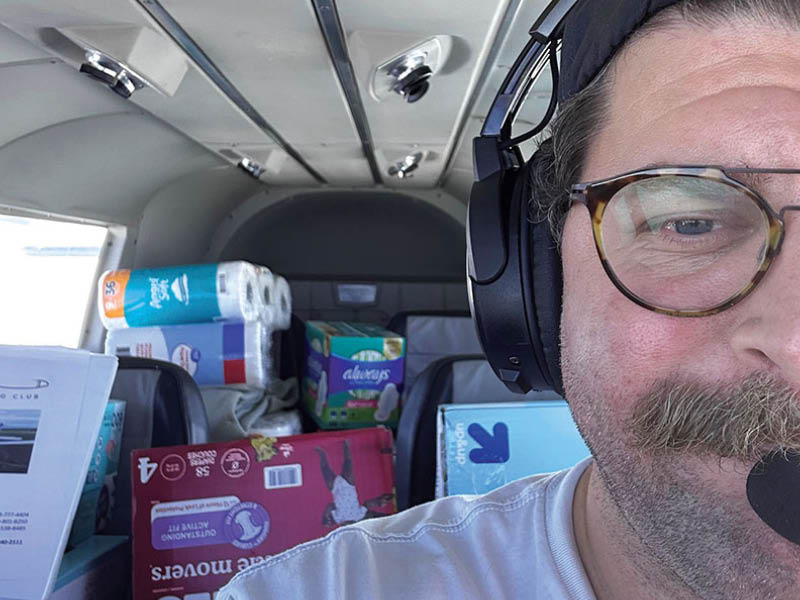Delta Pilot Transports Necessities to Helene-Ravaged Western North Carolina
By John Perkinson, Senior Staff Writer

Capt. Jeremy “Kane” Oldham (Delta), a resident of Holly Spring, N.C., flies a relief mission transporting necessities to western North Carolina towns impacted by Hurricane Helene.
While Hurricane Helene wreaked havoc along the northern Florida gulf coast in late September, this Category 4 storm will most likely be remembered for the catastrophic devastation it brought 500 miles north to the mountainous regions of western North Carolina. An estimated 1,400 landslides coupled with at least 6,000 miles of damaged roads left many of the hardest-hit communities isolated and accessible only by air. North Carolina Gov. Roy Cooper’s office estimated that the recovery costs for his state alone would total $53 billion.
While federal aid would later be dispatched (in the form of more than 6,100 National Guard and 7,000 federal personnel) and many charitable organizations, including ALPA and its Pilots for Pilots emergency fund, would provide relief, getting basic necessities to affected local residents was the first order of business. Groups like Operation Airdrop, a Texas-based nonprofit organization, coordinated the delivery of these much-needed provisions. Capt. Jeremy “Kane” Oldham (Delta), a resident of Holly Springs, N.C., was among the pilots who flew missions to transport the goods.
Oldham watched the televised news coverage of the extensive damage in locations like Asheville—a city he’d recently visited on a flying trip with some friends. Asheville is situated at the convergence of the French Broad and Swannanoa Rivers, leaving it particularly vulnerable to flooding, but few anticipated the extent of Helene’s destruction. “We thought the storm would be broken up by the mountains and that it would simply blow over the area, but that wasn’t the case,” he recalled.
On Sunday, September 29, the chief pilot of the Raleigh Flying Club called to see if Oldham, a club member, would be interested in volunteering to transport needed supplies on behalf of Operation Airlift. The club has a fleet of Beech A36 Bonanzas based at Raleigh-Durham International Airport, and Oldham said that he’d be happy to participate. Missions commenced the following day.
Operation Airdrop Executive Director Alex Clark recently explained his organization’s role in this kind of disaster relief effort. “We try to bridge the gap between when disaster hits to when roads are back open and able to be supplied via the normal means—the Federal Emergency Management Agency, the Red Cross, Samaritan’s Purse, etc.,” he said.
In preparation, Oldham’s wife went to a local warehouse club retail store and purchased diapers, wipes, gloves, cleaning products, and other goods. She also publicized Operation Airdrop’s local plans on social media, encouraging neighbors to stop by the Oldman house to drop off nonperishable foods and other essential items.
Oldham, an Airbus A220 pilot, who serves as a Delta Pilot Network field team coordinator, flew four Airdrop missions, initially delivering goods from Raleigh to Concord-Padgett Regional Airport in Concord, N.C., just northeast of Charlotte. These and other items were sorted, organized, and placed on pallets to be delivered. He then transported the pallets to airports in Rutherfordton, Statesville, and Asheville.
Operation Airdrop coordinated similar missions with numerous other aircraft, concluding its final delivery by noon on October 7, when several major roads had been reopened. In all, the charity completed 650 flights in just eight days carrying more than $1.2 million worth of supplies to those in need. With other organizations operating similar kinds of relief, the FAA subsequently reported that air traffic over the region during this period increased by nearly 300 percent.
“There were so many pilot volunteers flying that the airspace was saturated, making it difficult to land at locations like Rutherfordton,” Oldham remarked. Fortunately, the Bonanzas were equipped with Automatic Dependent Surveillance-Broadcast, allowing the Raleigh Flying Club pilots to see other traffic operating in and out of area airports. Given the volume of airplanes in the vicinity, he described the flying as “stressful,” adding, “There were no close calls, but you had to have your head on swivel.”
By providing their time and talents to transport necessities to the thousands of victims of this large-scale disaster, Oldham and other volunteer airline and general aviation pilots saved the day for those in need.
Operation Airdrop
Founded immediately following Hurricane Harvey in 2017, Operation Airdrop provides disaster relief, mobilizing volunteer pilots and a diverse fleet of aircraft to deliver essential supplies to areas cut off from traditional aid routes. Learn more and make a donation.

